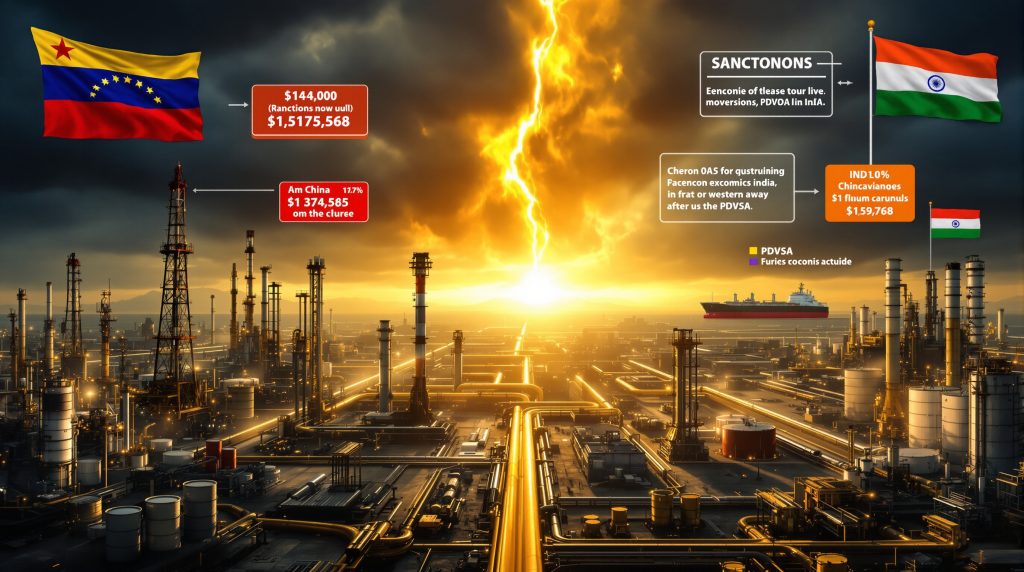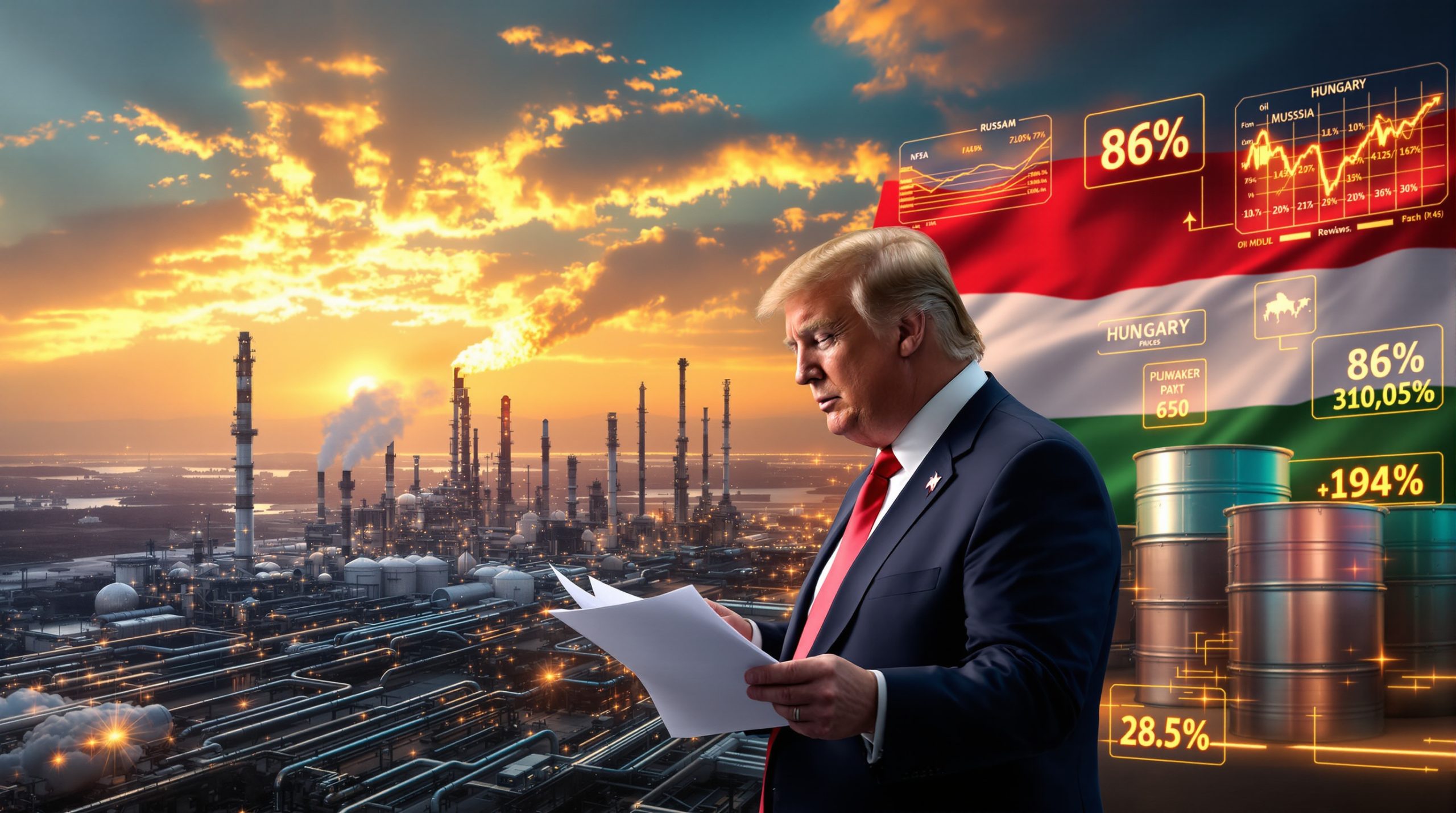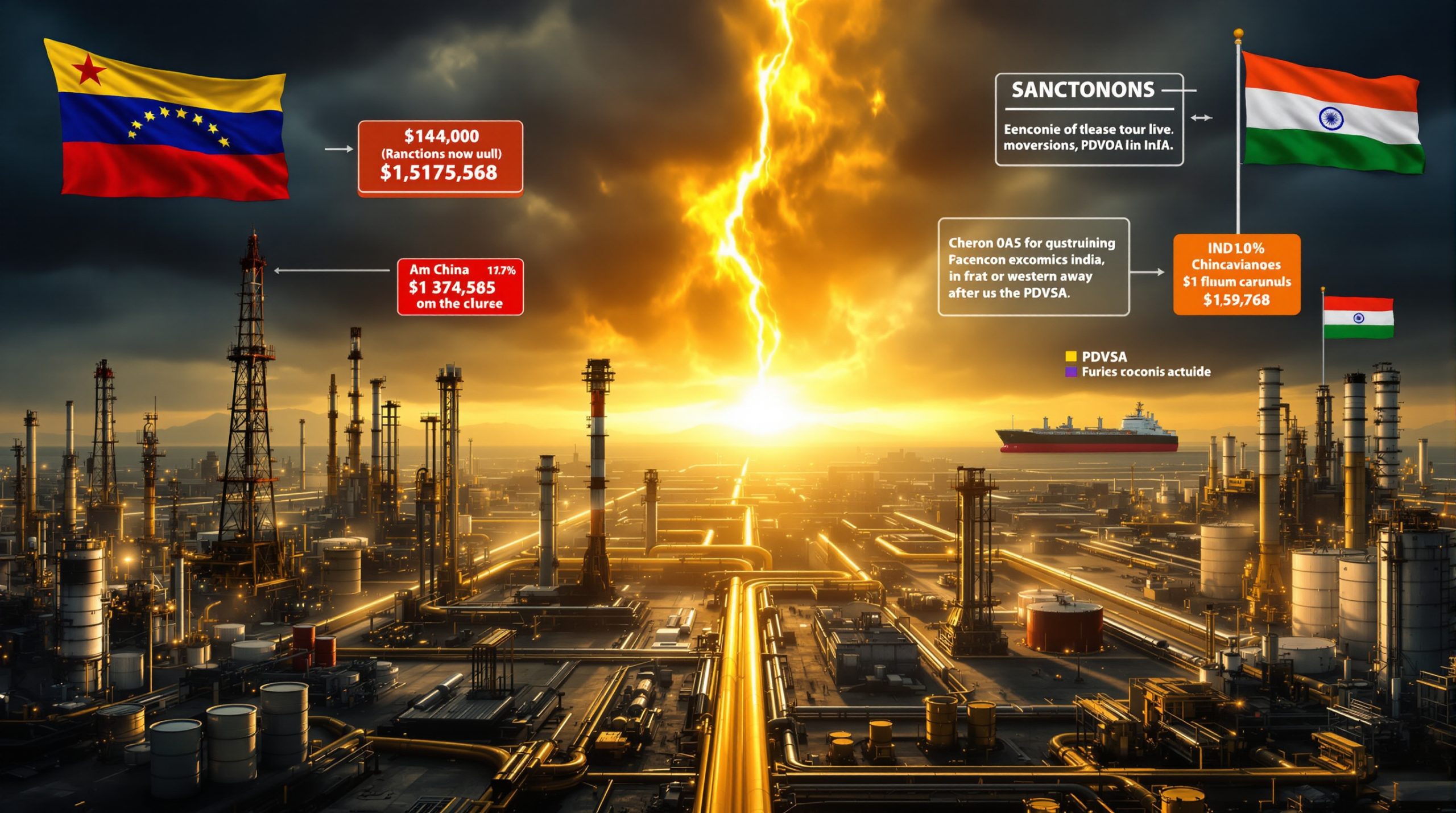Understanding the Current Sanctions Framework on Venezuelan Oil
The United States has constructed a comprehensive economic restrictions program targeting Venezuela's petroleum sector, fundamentally transforming how the country operates within global energy markets. U.S. sanctions on Venezuela oil primarily center on state-owned Petróleos de Venezuela (PDVSA), establishing significant obstacles for international oil transactions and technology transfers.
Core Elements of the Sanctions Regime:
-
Asset freezes affecting billions in PDVSA holdings across U.S. financial institutions
-
Export prohibitions on essential refining materials including naphtha and diluents
-
Mandatory licensing requirements for any energy sector engagement
-
Restrictions preventing direct currency payments to Venezuelan government entities
The Office of Foreign Assets Control (OFAC) maintains detailed oversight through its Specially Designated Nationals list, which includes numerous PDVSA subsidiaries and affiliates. Companies seeking to engage with Venezuelan petroleum operations must navigate complex licensing procedures that require demonstrating alignment with U.S. policy objectives while avoiding direct financial benefit to the Maduro administration.
Technical Implementation Mechanisms
The sanctions framework operates through multiple enforcement layers. Financial institutions face severe penalties for processing unauthorized transactions, while shipping companies must verify cargo origins and destinations. Insurance providers have largely withdrawn coverage for Venezuelan oil shipments, creating additional logistical barriers.
Payment mechanisms have shifted dramatically under these restrictions. Traditional dollar-denominated transactions are prohibited, forcing alternative arrangements including barter systems, oil-for-goods exchanges, and routing through non-U.S. financial networks. These workarounds often involve Chinese and Russian intermediaries who maintain separate payment systems outside Western banking infrastructure.
What Triggered the Latest Escalation in U.S. Sanctions on Venezuela Oil?
The reimposition of stringent petroleum sanctions during late 2023 stemmed from Venezuela's failure to implement promised electoral reforms following previous negotiation frameworks. The Biden administration had conditionally relaxed certain restrictions in exchange for commitments to transparent elections and opposition party participation.
However, following disputed presidential elections in July 2024, where Nicolás Maduro claimed victory amid widespread international skepticism, the United States reversed its more accommodating approach. The State Department determined that fundamental democratic reforms had not materialised despite prior agreements.
Key Escalation Timeline:
| Date | Action | Impact |
|---|---|---|
| October 2023 | Conditional sanctions relief | Limited U.S. company re-engagement |
| July 2024 | Disputed Venezuelan elections | International observer concerns |
| September 2024 | Sanctions reimposition | May 2025 company withdrawal deadline |
| November 2024 | Secondary sanctions threats | Third-party buyer pressure |
The May 2024 deadline required international companies to either cease operations or secure specific government waivers. This mechanism created significant uncertainty for energy companies with existing Venezuelan investments, particularly those with long-term infrastructure commitments.
Political Context and Enforcement
Under the current Trump administration, enforcement has intensified with naval patrols targeting maritime routes linked to Venezuelan operations. These interdiction efforts, ostensibly focused on narcotics trafficking, have created additional pressure on Venezuelan petroleum exports while avoiding direct military confrontation.
According to reporting from Oilprice.com dated October 31, 2025, tensions between the U.S. and Venezuela continue escalating despite President Trump ruling out immediate military strikes while maintaining naval presence in the Caribbean region.
How Have Sanctions Affected Major U.S. Energy Companies?
Chevron's Constrained Operations
Chevron Corporation represents the primary American energy company maintaining Venezuelan operations under severely restricted conditions. The company's joint ventures with PDVSA have experienced dramatic operational limitations since comprehensive sanctions implementation.
Operational Impact Assessment:
| Metric | Pre-Sanctions (2017) | Current Status (2025) |
|---|---|---|
| Production Capacity | Unrestricted operations | Limited to maintenance activities |
| Export Volumes | Full commercial scope | Significantly reduced output |
| Investment Authority | Capital expenditure approved | Deferred maintenance only |
| Payment Methods | Currency transactions | Oil-based compensation exclusively |
Chevron's Venezuelan operations now function under humanitarian maintenance licenses that prevent expansion activities while allowing essential safety and environmental protection measures. The company cannot receive direct dollar payments, instead accepting compensation through approved oil allocations that must be processed outside Venezuelan territory.
Broader Industry Withdrawal
Other major U.S. energy companies have largely exited Venezuelan markets entirely. ExxonMobil, which previously held significant offshore exploration rights, ceased operations following asset nationalisations and subsequent legal disputes. Independent producers have found licensing requirements too restrictive to justify continued engagement.
The withdrawal of American technical expertise has created operational challenges for Venezuelan petroleum facilities. Advanced drilling technologies, enhanced recovery techniques, and sophisticated refining processes previously provided by U.S. companies are no longer available through conventional channels.
Impact on Gulf Coast Refineries and Supply Chain Restructuring
American refineries historically dependent on Venezuelan heavy crude have undergone significant supply chain restructuring. Furthermore, the oil price rally has intensified market pressures. Venezuela's heavy-sour crude grades, with API gravity typically ranging from 8-16 degrees, provided ideal feedstock for Gulf Coast facilities designed for complex heavy oil processing.
Alternative Supply Sources:
-
Middle Eastern Heavy Grades: Arab Heavy, Kuwait Export Crude, and other regional blends
-
Canadian Heavy Oil: Western Canadian Select and other tar sands derivatives
-
Guyanese Production: Rapidly expanding Stabroek field output
-
Mexican Maya Crude: Limited availability due to declining Mexican production
These developments have contributed to broader oil price movements across global markets. Additionally, the OPEC production impact has become increasingly significant as alternative supply sources are evaluated.
Logistical and Economic Challenges
The geographic proximity of Venezuelan crude to U.S. Gulf Coast refineries previously offered significant transportation cost advantages. Replacement sources require longer shipping routes, increasing transportation expenses and delivery timeframes. Middle Eastern alternatives add 15-20 days transit time compared to Venezuelan supplies.
Furthermore, the US oil production decline has created additional supply pressures. Insurance costs have increased for alternative supply routes due to geopolitical tensions affecting various regions. The war in Ukraine, Middle Eastern conflicts, and sanctions on Russian petroleum have created a complex risk environment for international oil transportation.
Refinery Adaptation Requirements:
-
Modified processing configurations for different crude qualities
-
Enhanced sulphur treatment capabilities for varying sour crude specifications
-
Inventory management adjustments for longer supply chain cycles
-
Alternative crude evaluation and blending optimisation
Which Countries Continue Trading Venezuelan Oil Despite U.S. Sanctions?
Despite Western sanctions pressure, several major economies maintain substantial petroleum trade relationships with Venezuela through various mechanisms designed to circumvent U.S. restrictions.
China's Strategic Energy Partnership
China has emerged as Venezuela's primary petroleum customer, purchasing crude through state-owned entities including PetroChina and CNOOC. These transactions typically involve barter arrangements where China provides finished goods, equipment, and financing in exchange for oil deliveries.
Chinese companies operate under oil-for-loan agreements backed by Chinese development banks, avoiding direct dollar transactions while securing long-term crude supplies. This arrangement provides Venezuela with essential imports while offering China discounted petroleum access.
The bilateral energy relationship extends beyond crude purchases to include refinery operations, pipeline construction, and oilfield development projects. Chinese technical expertise has partially filled the gap left by departing Western companies.
India's Refining Demand
Indian refineries have significantly increased Venezuelan crude processing, leveraging their sophisticated heavy oil refining capabilities. Companies including Indian Oil Corporation and Hindustan Petroleum have expanded purchases through third-party trading arrangements.
Indian purchases often occur through intermediary trading companies, creating distance between refineries and direct sanctions exposure. These complex transaction structures allow continued commerce while managing political risk.
Regional Processing Hub Development:
-
Enhanced heavy crude refining capacity utilisation
-
Specialised product slate optimisation for Venezuelan feedstock
-
Strategic petroleum reserve accumulation during discounted purchasing periods
-
Technology transfer for heavy oil upgrading processes
Russia's Collaborative Approach
Russian energy companies maintain cooperation with Venezuelan counterparts despite both countries facing U.S. sanctions. This partnership involves technical assistance, equipment provision, and joint marketing of petroleum products to willing buyers.
Russian expertise in sanctions evasion, developed through years of Western restrictions, provides valuable knowledge for Venezuelan operations. Joint shipping arrangements and financial mechanisms help both countries access international markets despite regulatory obstacles.
Economic Consequences for Venezuela's Oil Sector
Production and Export Recovery
Despite sanctions pressure, Venezuela's petroleum sector has demonstrated remarkable resilience. Export volumes reached 1.09 million barrels per day in September 2025, representing the highest level since early 2020, according to Reuters reporting from October 1, 2025.
This recovery reflects successful adaptation to sanctions constraints through alternative customer development and operational efficiency improvements. Venezuelan production techniques have evolved to maximise output despite limited access to advanced Western technology.
Export Performance Metrics:
| Period | Daily Export Volume | Primary Destinations |
|---|---|---|
| Pre-2017 | 2.0-2.5 million bpd | U.S., Caribbean, Europe |
| 2020-2022 | 0.6-0.8 million bpd | China, India |
| September 2025 | 1.09 million bpd | Asia-Pacific, selective buyers |
As noted in the Oilprice.com article from October 31, 2025, these shipments have become increasingly important for Chinese and Indian refiners amid sanctions on Russia and tight heavy-crude supply elsewhere.
Revenue and Investment Impact
Venezuelan oil revenues have declined substantially from pre-sanctions levels, constraining government finances and infrastructure investment capacity. However, the country has developed alternative revenue streams through barter arrangements and non-dollar transactions.
Financial Impact Assessment:
-
Pre-2017 estimated annual oil revenue exceeded $30 billion
-
Current revenue estimates range from $8-15 billion annually
-
International reserve holdings have declined to critically low levels
-
Capital expenditure in petroleum sector remains severely constrained
The shift toward Asian markets has required acceptance of significant price discounts compared to benchmark crude prices. Venezuelan petroleum typically trades at $8-15 per barrel below comparable quality crude due to sanctions risk and logistical complications.
Infrastructure Maintenance Challenges
Limited access to Western technology and financing has created significant challenges for petroleum infrastructure maintenance. Aging refineries, pipeline systems, and production facilities require ongoing investment to maintain operational capacity.
Venezuelan engineers have developed innovative approaches to equipment maintenance using available resources and alternative supplier networks. However, production efficiency remains below historical levels due to deferred maintenance and technology gaps.
How Do Sanctions Affect Global Heavy Oil Markets?
The restriction of Venezuelan crude creates supply constraints in specific market segments, particularly affecting refineries configured for heavy-sour crude processing. This disruption has ripple effects throughout global petroleum markets.
Heavy Crude Supply Dynamics
Global heavy crude availability has tightened significantly due to multiple supply disruptions affecting major producers. In addition to U.S. sanctions on Venezuela oil, restrictions on Russian petroleum and declining Mexican production have created scarcity in heavy-grade feedstocks.
Primary Heavy Crude Sources:
-
Canada: Western Canadian Select and synthetic crude production
-
Middle East: Saudi Arabian Heavy, Kuwait Export Crude
-
Latin America: Remaining Mexican Maya, Brazilian heavy grades
-
Venezuela: Limited availability due to sanctions constraints
The concentration of heavy crude production among fewer accessible sources has increased price volatility and supply chain vulnerability. Refineries must compete more intensively for available heavy crude supplies, driving up acquisition costs.
Price Premium Development
Heavy crude traditionally trades at discounts to lighter grades due to higher processing requirements. However, supply constraints have narrowed these discounts and occasionally created premium pricing for specific heavy crude qualities.
Refineries with coking capacity and heavy oil processing infrastructure can capitalise on these market dynamics, but those dependent on specific crude qualities face margin pressure when preferred feedstocks become unavailable.
Strategic Implications for Refiners
The Venezuelan supply disruption has forced refineries to reassess their feedstock strategies and processing flexibility. Consequently, the Alaska oil policy developments have gained increased attention as alternative supply sources. Some facilities have invested in upgrades enabling broader crude slate processing, while others have accepted reduced utilisation rates.
Market Adaptation Strategies:
-
Crude slate diversification initiatives
-
Processing unit flexibility enhancements
-
Strategic inventory management for scarce grades
-
Alternative supplier relationship development
As mentioned in the October 31, 2025 Oilprice.com report, any disruption caused by new U.S. enforcement actions could once again squeeze global heavy-sour markets.
The Role of Waivers and Exemptions in Venezuelan Sanctions
The U.S. Treasury maintains authority to grant specific licences allowing limited engagement with Venezuelan petroleum operations under carefully defined circumstances. These exemptions serve strategic policy objectives while maintaining overall sanctions pressure.
Licensing Categories and Requirements
Humanitarian Operations:
Companies may receive authorisation for activities providing essential goods and services to Venezuelan civilian populations. These licences require demonstration that activities do not directly benefit government entities or military apparatus.
Debt Restructuring:
Limited licences allow negotiation of existing debt obligations and legal proceedings related to creditor claims. Court-approved settlements and asset recovery through approved channels may receive authorisation.
Safety and Environmental:
Emergency licences may be granted for activities preventing environmental damage or addressing immediate safety threats. These typically involve short-term interventions rather than ongoing operations.
Essential Infrastructure:
Maintenance activities deemed critical for civilian infrastructure may receive approval, but expansion or enhancement projects remain prohibited.
Application and Approval Process
OFAC maintains strict evaluation criteria for licence applications, requiring detailed documentation of proposed activities and their alignment with U.S. policy objectives. Applicants must demonstrate:
-
Clear humanitarian or policy justification
-
Minimal financial benefit to sanctioned entities
-
Robust compliance monitoring capabilities
-
Time-limited scope with specific performance metrics
The approval process typically requires several months of review, with many applications receiving modifications or conditions rather than outright approval. Success rates vary significantly by activity type and applicant track record.
Are U.S. Sanctions on Venezuela Oil Achieving Their Political Objectives?
The effectiveness of Venezuelan petroleum sanctions in promoting political change remains a subject of considerable debate among policy analysts and regional experts.
Intended Political Outcomes
The sanctions regime aims to pressure democratic reforms through economic constraints on government resources. Primary objectives include:
-
Electoral Transparency: Encouraging free and fair elections with international oversight
-
Opposition Participation: Enabling legitimate political opposition activities
-
Humanitarian Access: Facilitating international aid delivery to civilian populations
-
Governance Reform: Promoting rule of law and institutional strengthening
Actual Political Developments
Despite years of sanctions pressure, fundamental political changes have not materialised as intended. The July 2024 elections, while disputed internationally, resulted in Maduro's continued presidency with limited opposition access to electoral processes.
Observable Political Trends:
-
Continued restrictions on opposition political activities
-
Limited improvement in electoral transparency mechanisms
-
Persistent constraints on international humanitarian access
-
Authoritarian governance practices remain largely unchanged
Unintended Consequences and Adaptations
The sanctions regime has produced several counterproductive effects that complicate U.S. policy objectives:
Enhanced Authoritarian Resilience:
Economic pressure has prompted development of alternative governance mechanisms less dependent on traditional international systems.
Geopolitical Realignment:
Venezuela has strengthened ties with China, Russia, and other U.S. adversaries, reducing American influence over Venezuelan decision-making.
Regional Security Complications:
Migration pressures and economic instability have created humanitarian challenges affecting neighbouring countries.
Limited Humanitarian Impact:
Sanctions constraints have complicated aid delivery while failing to achieve desired political reforms.
Alternative Assessment Frameworks
Some analysts argue that sanctions success should be measured by containment rather than regime change. From this perspective, limiting Venezuelan petroleum revenues and preventing regional influence expansion may justify continued restrictions regardless of immediate political outcomes.
However, critics contend that humanitarian costs and geopolitical realignment toward U.S. adversaries undermine long-term strategic interests while failing to achieve stated democracy promotion objectives.
Regional Security Implications of Venezuelan Oil Sanctions
Caribbean Maritime Security
U.S. naval operations targeting Venezuelan-linked maritime activities have intensified regional security tensions. These patrols, officially focused on narcotics interdiction, create additional pressure on Venezuelan petroleum exports while avoiding direct military confrontation.
The militarisation of sanctions enforcement has raised concerns among Caribbean nations regarding maritime sovereignty and economic disruption. Regional shipping routes face increased insurance costs and operational complications due to enforcement activities.
Maritime Security Developments:
-
Expanded U.S. naval presence in Caribbean waters
-
Increased vessel inspections and cargo verification procedures
-
Higher insurance premiums for regional petroleum transportation
-
Diplomatic tensions with traditional Caribbean partners
Impact on Neighbouring Oil Producers
The Venezuelan crisis has elevated the strategic importance of alternative regional petroleum producers, particularly Guyana's rapidly expanding offshore operations.
Guyana's Strategic Emergence:
ExxonMobil's Stabroek field has become increasingly significant as Venezuelan alternatives decline. Production from this development has reached over 600,000 barrels per day with expansion plans targeting 1.2 million barrels per day by 2027.
However, maritime boundary disputes between Venezuela and Guyana continue complicating regional energy development. Venezuela maintains territorial claims over portions of Guyana's Exclusive Economic Zone containing significant petroleum resources.
Trinidad and Tobago Energy Implications
Recent developments involving ExxonMobil's gas exploration agreement with Trinidad and Tobago have drawn Venezuelan attention. Venezuela has formally requested clarification from Port of Spain regarding project boundaries and potential maritime overlap with Venezuelan claims.
This dispute highlights how Venezuelan tensions extend beyond bilateral U.S.-Venezuela relations to affect broader regional energy development patterns.
Future Policy Evolution and Market Implications
Potential Sanctions Modification Scenarios
Several pathways exist for future policy evolution depending on political developments and strategic reassessments:
Escalation Possibilities:
- Extended secondary sanctions targeting third-party buyers
- Comprehensive technology export restrictions
- Enhanced financial sector isolation measures
- Expanded maritime enforcement operations
De-escalation Options:
- Conditional licensing expansion for specific activities
- Humanitarian exemption broadening
- Phased sanctions relief tied to political benchmarks
- Regional stability-focused modifications
Energy Market Preparation Strategies
Industry participants are developing contingency frameworks addressing potential policy changes:
Corporate Risk Management:
- Supply chain diversification beyond Venezuelan dependence
- Alternative heavy crude sourcing agreement development
- Technology partnership restructuring for compliance flexibility
- Regional market position optimisation
Investment Pattern Implications:
- Deferred Venezuelan petroleum infrastructure investment
- Enhanced focus on Guyanese and Brazilian offshore development
- Caribbean LNG project acceleration
- Heavy crude refining capacity geographic redistribution
Regional Energy Security Considerations
The Venezuelan sanctions experience demonstrates vulnerabilities in petroleum supply chains dependent on politically unstable regions. This has prompted reassessment of energy security frameworks throughout the Americas.
Strategic Planning Elements:
- Regional petroleum reserve coordination mechanisms
- Alternative supplier network development
- Maritime security cooperation enhancement
- Energy infrastructure resilience improvement
Lessons for Energy Policy and Economic Statecraft
Effectiveness Assessment Framework
The Venezuelan oil sanctions provide valuable insights into economic pressure campaign limitations and design considerations:
Successful Elements:
- Significant revenue reduction for targeted government entities
- International awareness elevation of governance issues
- Multilateral coordination enhancement with allied nations
- Alternative regional energy development acceleration
Implementation Challenges:
- Limited political change achievement despite economic pressure
- Humanitarian impact on civilian populations requiring mitigation
- Authoritarian resilience mechanism development by target state
- Unintended geopolitical realignment toward U.S. adversaries
Global Energy Security Insights
The sanctions highlight several critical vulnerabilities in international petroleum markets:
Supply Chain Concentration Risks:
Heavy crude production remains concentrated among limited suppliers, creating vulnerability to political disruptions affecting any major producer.
Geopolitical Weaponisation:
Energy resources increasingly serve as tools of international pressure, requiring diverse supply networks for security.
Technology Transfer Restrictions:
Sanctions limiting technology access can have long-term production impacts extending beyond immediate political objectives.
Strategic Recommendations for Stakeholders
For Policymakers:
- Develop comprehensive assessment frameworks balancing political objectives with economic and humanitarian costs
- Enhance coordination mechanisms with allied nations for maximum pressure effectiveness
- Create clear escalation and de-escalation pathways tied to measurable political benchmarks
- Address unintended consequences through targeted mitigation strategies
For Energy Companies:
- Diversify supply chains beyond dependence on politically unstable regions
- Develop robust compliance frameworks capable of adapting to evolving sanctions regimes
- Invest in processing flexibility enabling broader crude slate utilisation
- Maintain strategic relationships across multiple geographic regions
For Regional Partners:
- Enhance energy cooperation mechanisms reducing dependence on disputed suppliers
- Develop alternative maritime security frameworks protecting commercial interests
- Create petroleum reserve coordination systems improving collective energy security
- Balance economic opportunities with broader strategic stability considerations
Disclaimer: The information presented in this article is for educational and analytical purposes only. Sanctions regulations change frequently, and specific legal guidance should be obtained from qualified attorneys for any business activities involving sanctioned entities or regions. Investment decisions should not be based solely on the analysis provided in this article.
The ongoing evolution of U.S. sanctions on Venezuela oil will continue shaping global energy markets, regional security dynamics, and international approaches to economic statecraft. Understanding these complex relationships remains essential for navigating an increasingly interconnected and politically volatile global petroleum landscape.
Looking for Energy Investment Opportunities Beyond Traditional Markets?
Discovery Alert's proprietary Discovery IQ model delivers real-time alerts on significant ASX mineral discoveries, helping investors identify actionable opportunities while global energy markets face ongoing sanctions and supply disruptions. Understand why major mineral discoveries can generate substantial returns by exploring Discovery Alert's dedicated discoveries page, and begin your 30-day free trial today to position yourself ahead of the market.




